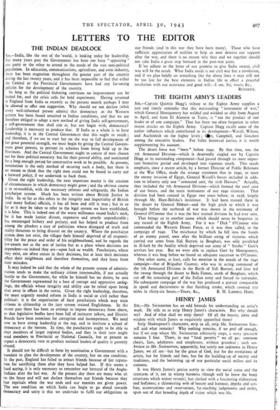THE EIGHTH ARMY'S LEADERS
SIR,—Captain Quintin Hogg's tribute to the Eightn Army supplies a just and timely reminder that this outstanding " instrument of war," which General Montgomery has welded and wielded so ably from August to April, and from El Alamein to Tunis, is " not the product of one leader or of one campaign." That has been too often forgotten in other recent articles on the Eighth Army. Captain Hogg recalls some of the earlier influences which contributed to its development—Wavell, Wilson, and Auchinleck on the higher levels ; gat t , Campbell, and Goschen among the executive leaders. For fuller historical justice, it is worth supplementing his account.
The desert force was " born "before 1940. By that time, too, the 7th Armoured Division—which is deservedly singled out by Captain Hogg as its outstanding component—had passed through its most impor- tant formative period and developed into vigorous youth. This needs emphasis, since a recent article, by a former Director of Public Relations at the War Office, made the strange statement that in 1940, to meet the enemy invasion of Egypt, General Wavell's forces included in addi- tion to infantry only one "armoured unit, the 11th Hussars." Actually, they included the 7th Armoured Division—which formed the steel core of our forces, and the main instrument of our 1940 victories. That division had been created in Egypt two years before, in 1938, largely through Mr. Hore-Belisha's insistence. It had been trained there in the desert by General Hobart—and the high pitch to which it was brought before the outbreak of war was shown in the testimony of General O'Connor that it was the best trained division he had ever seen.
That brings us to another name which should never be forgotten in any record of the Eighth Army. For it was " Dick " O'Connor who commanded the Western Desert Force, as it was then called, in the campaign of 1940. The mischance by which he fell into the hands of an enemy patrol, soon after the brilliant string of victories which carried our arms from Sidi Barrani to Benghazi, was only paralleled in ill-luck by the fatality which deprived our army of " Strafer " Gott's services last year. But we were able to replace Gott by Montgomery, whereas it was long before we found an adequate successor to O'Connor.
One other name, at least, calls for mention in the annals of the 1940 campaign—that of Brigadier Gaunter, who was in acting command of the 7th Armoured Division in the Battle of Sidi Barrani, and later led the swoop through the desert to Beds Fomm, south of Benghazi, which cut off the remaining part of the Italian army and forced its surrender. No subsequent campaign of the war has produced a pursuit comparable in speed and decisiveness to that finishing stroke, which covered 170
miles in thirty-six hours.—Yours, &c., B. H. LInDEt.L HART.






















 Previous page
Previous page